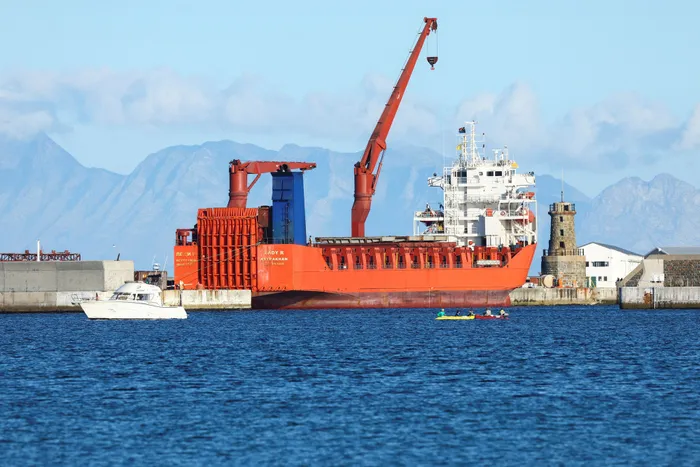South Africa has non-aligned itself out of relevance

Picture: Esa Alexander/REUTERS/Taken on December 7, 2022 – Russian roll-on/roll-off container carrier 'Lady R' docks at Simon's Town Naval Base, in Cape Town, South Africa. The South African rand crashed to a record low on May 11, shortly after US ambassador, Reuben E Brigety, accused this country of providing weapons and ammunition to Russia for its war in Ukraine.
Reuben E Brigety II, the bow-tie-loving US ambassador to South Africa, does not look like a man who would bring a roof down. But he did. The South African rand crashed to a record low on May 11, shortly after he accused the country of providing weapons and ammunition to Russia for its war in Ukraine. A row between Pretoria and Washington would put billions of dollars in trade at risk.
A furious South African government denied that the weapons were secretly loaded into a ship at a naval base near Cape Town. Meanwhile, the radical Economic Freedom Fighters and South African Communist Party called for Brigety to be booted out of the country. So did many commentators. Meanwhile, President Cyril Ramaphosa said an investigation had already been under way when Brigety made his remarks.
Two days later, the ambassador apologised, and admitted he had “crossed the line” with the manner of his comments. South African Finance Minister Enoch Godongwana announced they had resolved the diplomatic kerfuffle and that South Africa was unlikely to face any repercussions. Calm returned to relations between Pretoria and Washington.
To the rest of Africa, however, the Russian ship episode, and its handling by the South African political class, were just part of the clumsiness that has diminished the standing of what was once the economic superpower of the Continent. It was South Africa-based pay-TV pioneer DStv that brought the world into African homes. MTN was synonymous with mobile telephony across the Continent. South African supermarkets, and retailers, fanned out into the Continent and drove a new wave of consumption. South African Airways was the juggernaut of the skies. Today that “bad” South Africa is history – and it’s not good for the country.
In 2014, Nigeria took the prize as Africa’s largest economy and has held on to it since. South Africa is in second place – after losing the spot briefly to Egypt. In countries like Uganda and Rwanda, MTN remains strong, and South African banks are still stalwarts in several nations. But in 2020, South African Airways collapsed. Supermarket chain ShopRite and retail behemoth Massmart, once supreme across the Continent, have exited several African markets.
South Africa scores lowest on the Africa Visa Openness Index (AVOI) by the African Development Bank. The annual study tracks whether entry is visa-free for citizens from other sub-Saharan African countries, if a visa on arrival can be obtained, and if visas must be secured in advance. The low standing has further hurt business in South Africa.
The country was, of course, a once-upon-a-time political beacon because of Nelson Mandela. Everyone loved Madiba. When the cerebral and sometimes mercurial Thabo Mbeki succeeded to the presidency, he spoke of an “African Renaissance” and, replacing the discredited Organisation of African Unity with the African Union (AU), helped establish the African Peer Review Mechanism (APRM), to hold the Continent’s leaders democratically accountable and to censure them in cases of corruption and human rights abuse. The APRM has since withered away – not least because so many of those evils have played havoc with South Africa’s own politics.
When Brigety started the arms controversy, he said the alleged Russia deal raised questions about South Africa’s vaunted “non-aligned” status in the developing world. Ramaphosa went to some pains to underline that South Africa remained so and wouldn’t be pressured into changing its reputation for independent policies. Indeed, Pretoria abstained from the March 2022 and February 2023 United Nations resolutions against Russian aggression against Ukraine (28 African nations voted in favour).
As precious as South Africa’s non-aligned status may be, it’s a toothless strategy in the current diplomatic round. No one gets rewarded for being neutral. Indeed, there is little recompense for African states who choose to condemn Russia. Kenya got a few visits from foreign dignitaries but not much more. South Africa might have been better off saying it was supplying weapons to Russia. As alarming and unlikely as that would have been, Pretoria would at least have had a stronger geopolitical hand to play. Short of something like that, the Continent’s giant will just keep getting smaller and smaller.
Charles Onyango-Obbo is a journalist and writer based in Nairobi, Kenya.This column does not necessarily reflect the opinion of the editorial board or Bloomberg LP and its owners.
This article was published in The Washington Post